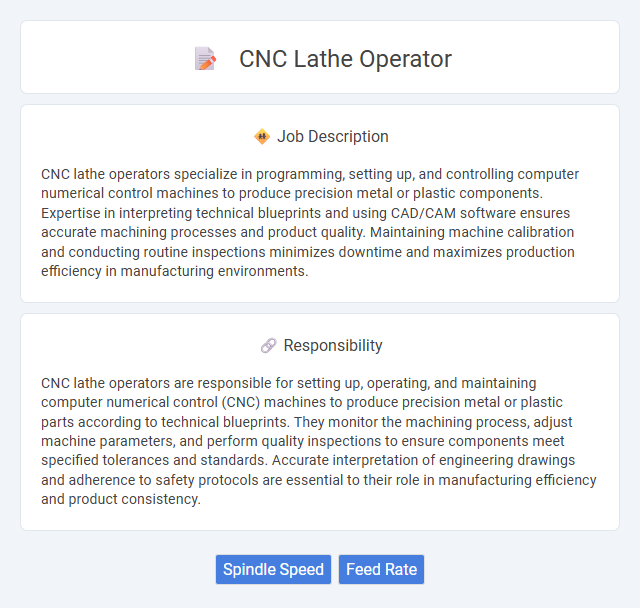
CNC lathe operators specialize in programming, setting up, and controlling computer numerical control machines to produce precision metal or plastic components. Expertise in interpreting technical blueprints and using CAD/CAM software ensures accurate machining processes and product quality. Maintaining machine calibration and conducting routine inspections minimizes downtime and maximizes production efficiency in manufacturing environments.
CNC lathe operator roles may be more suitable for individuals who exhibit strong attention to detail and possess good hand-eye coordination, as these traits are likely crucial for precision machining tasks. People with an interest in mechanical processes and problem-solving might find this job rewarding and aligned with their skills. Those who prefer repetitive, focused work environments may have a higher probability of adapting well to the demands of this position.
Qualification
CNC lathe operators must possess strong technical skills, including proficiency in reading blueprints and computer-aided design (CAD) software. Candidates typically require a high school diploma or equivalent, supplemented by vocational training or certificates in CNC machining. Experience with precision measurement tools and knowledge of machining processes ensure accurate and efficient production.
Responsibility
CNC lathe operators are responsible for setting up, operating, and maintaining computer numerical control (CNC) machines to produce precision metal or plastic parts according to technical blueprints. They monitor the machining process, adjust machine parameters, and perform quality inspections to ensure components meet specified tolerances and standards. Accurate interpretation of engineering drawings and adherence to safety protocols are essential to their role in manufacturing efficiency and product consistency.
Benefit
Working as a CNC lathe operator likely provides a stable income due to high demand in manufacturing industries. Operators may benefit from opportunities to develop technical skills and advance into more specialized or supervisory roles. The job often includes advantages such as health insurance, paid leave, and potential overtime pay, contributing to overall financial security.
Challenge
CNC lathe operator roles likely involve complex troubleshooting challenges that require keen attention to detail and problem-solving skills. Operators probably face the probability of frequent adjustments to maintain precision and meet tight production tolerances. The ability to anticipate potential machine malfunctions or material inconsistencies may significantly impact operational efficiency and product quality.
Career Advancement
CNC lathe operators can advance their careers by acquiring advanced programming skills and mastering multi-axis machining techniques. Gaining certifications such as Certified Manufacturing Engineer (CMfgE) or CNC Programmer Certification enhances job prospects and eligibility for supervisory roles. Experienced operators often move into positions like CNC supervisor, manufacturing engineer, or production manager, benefiting from increased responsibilities and higher salaries.
Key Terms
Spindle Speed
CNC lathe operators must expertly control spindle speed to ensure precision machining and optimal surface finishes on metal or plastic components. Proper adjustment of spindle speed directly influences cutting efficiency, tool wear reduction, and dimensional accuracy in producing cylindrical parts. Mastery of spindle speed settings tailored to material type and tooling specifications increases overall production quality and reduces downtime.
Feed Rate
A CNC lathe operator expertly programs and adjusts the feed rate to ensure precise cutting and optimal surface finish during machining processes. Accurate feed rate control directly impacts tool wear, material removal rate, and overall production efficiency in metalworking. Mastery of feed rate settings contributes to reduced cycle times and high-quality components in manufacturing industries.
 kuljobs.com
kuljobs.com